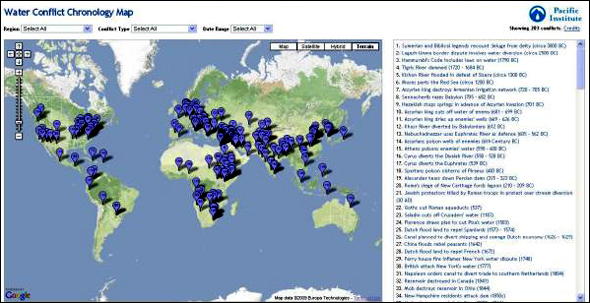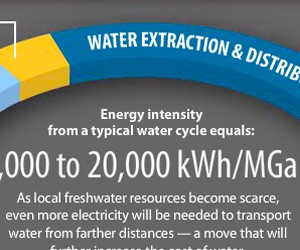Peter Gleick: Sneaky Bottled Water Advertising
Americans drink bottled water for many reasons, including fear of the tap water, convenience, taste, and relentless, pervasive advertising and marketing. Some of this advertising is blatant and obvious: ads on TV or in magazines for particular brands of bottled water, big billboards that blight every public sightline, and visible reminders in supermarkets and convenience stores, and ubiquitous vending machines.
But other advertising is more subtle. That is the subliminal advertising that bombards us through “product placement” or “embedded advertising” in television shows and movies. I’ve always liked the TV show Scrubs, but it always bugged me that they regularly and persistently placed various bottled water brands in the hands of the lead actors, including especially the notorious “Penta” brand, which made (and in some places continues to make) outrageous, unsubstantiated, and downright false claims about magic restructuring of the molecules of water and health benefits. Indeed, they’ve been sanctioned for false advertising in Great Britain. I have no idea if the producers and writers received money for this product placement, or if it was done in return for some other service or benefit, but it is rare that specific products appear on shows without some kind of financial deal.
Water Numbers: One industry estimate says that bottled water advertising exceeded $150 million a year in 2005, and it has continued to grow substantially since then. In 2007, paid product placement was estimated to be nearly $3 billion and growing by 30% a year.
Just recently, an especially odd example came to my notice (thanks to Emily Green, who writes the Chance of Rain blog, for finding this). The TV show Private Practice, which I don’t watch, had the following remarkable 17-second clip (now posted on YouTube) from Episode 6 in Season 4, in which one of the leading characters goes up to the office refrigerator and says, “You know what I love about this place? None of this toting around thermoses. Just good old, environmentally unsound, non-biodegradable, here-for-a-thousand-years plastic bottles.” As she says this, she takes out a big square bottle of Fiji Water (yes, really bottled and transported here from Fiji), opens it and takes a swig.
Not being a regular viewer, I don’t know these characters at all. I don’t know if she is environmentally savvy and is being sarcastic (though, if so, why isn’t she drinking from the tap), or environmentally antagonistic and mocking the growing social movement away from bottled water. And I don’t know if the producers received money from Fiji Water, in which case this counts as direct product placement and not social commentary.
Perhaps regular Private Practice viewers can weigh in with their opinions or insights? And it would be interesting to hear from the producers whether money changed hands on this scene or they thought they were just writing punchy dialogue.
Next time you watch TV or a movie, keep a sharp eye out for both obvious ads and more subtle product placements and see if you can see the sneaky hands of the advertisers at work.
Peter Gleick










As a fellow foreigner to Private Practice, I’m not sure whether that comment was intended to be sarcastic or not. However, it seems that the information that the character conveys about the Fiji water (regardless of whether she’s drinking it) is still negative. Even if her character is being sincere, she’s giving the audience negative information about bottled water, information that (sadly) could be new to viewers.
The CBS series How I Met Your Mother does a great job of subtly slipping environmentalism into the show; in one episode, a main character wears a shirt with a recycling symbol but never explicitly talks about it.
Personally, I just appreciate when environmental topics are infused into programming period because it raises awareness and makes them more mainstream.
This is such a great resource that you are providing and you give it away for free. I enjoy seeing websites that understand the value of providing a prime resource for free. I truly loved reading your post. Thanks!